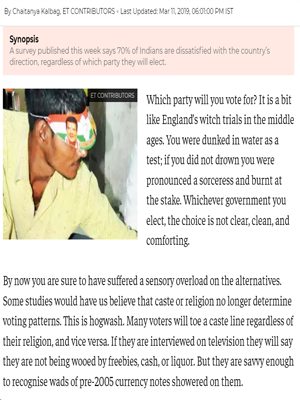Which party will you vote for in Lok Sabha polls 2014? Choice not clear or comforting
[The Ecomonic Times]
Published date: 11th Mar 2019
Which party will you vote for? It is a bit like England’s witch trials in the middle ages. You were dunked in water as a test; if you did not drown you were pronounced a sorceress and burnt at the stake. Whichever government you elect, the choice is not clear, clean, and comforting.
By now you are sure to have suffered a sensory overload on the alternatives. Some studies would have us believe that caste or religion no longer determine voting patterns. This is hogwash. Many voters will toe a caste line regardless of their religion, and vice versa. If they are interviewed on television they will say they are not being wooed by freebies, cash, or liquor. But they are savvy enough to recognise wads of pre-2005 currency notes showered on them.
Our Gross National Happiness is running low. A Pew Research Center survey published this week says 70% of Indians are dissatisfied with the country’s direction, regardless of which party they will elect. As many as 89% of those surveyed said inflation was a big problem; 85% were worried about a lack of job opportunities; 82% were disgruntled about the rich-poor gap; 73% said our economic system favours the wealthy; and 83% are very distressed by corruption. But do these anxieties grip our major parties? Perish the thought! The Bharatiya Janata Party has not even bothered to issue a manifesto – the Narendra Modi websites, tweets and a growing body of hagiography will suffice for the poor voter.
Congress has issued a wordy manifesto that promises more of the UPA’s ruinous social-entitlement spending. Nobody wants to even think of moving from populism to propulsion. Think-tanks have been in frenzied debate about the rise of criminality in Parliament, and how money plus muscle spell win- ability. But did that trigger a cleaner roster? The BJP has been warmly embracing a loathsome beauty parade, and Congress is cuddling up with sons, daughters, billionaires and random primaries. The AAP has become a shelter for the tired, the poor, and our huddled masses yearning to breathe free. If you are a malcontent, you can interpret that as you please.
What sort of thrill are the 100 million first-time voters going to feel starting next week? We are widely rumoured to be a young nation, full of vim and verve, raring to be No.3 in the world, but you wouldn’t know it if you looked around. Everyday life is stressful, except if you are a servant of the people and your assets skyrocket as you serve.
Management gurus urge a helicopter view of things; this is happening thanks to thousands of campaign flight-plans. Decked out in garlands of 500-rupee notes, cocooned in Z-plus security, firing out lakhs of SMS exhortations, our leaders have loosed a stream of Sudarshan chakras that are dazzling and beguiling.
This is of a piece with millions of young people in our countryside who now have more schooling than their parents did and aspire for a better lifestyle. The bad news is that India’s tepid growth has been jobless over the past decade. Migration to our cities and larger towns is speeding up, and filling a powder keg of slowly rising discontent. Deep into the second decade of the 21st a wannabe superpower would have economic policies that create jobs, boost manufacturing and exports, and attract investment and foreign trade. You would hope that the quest for growth would trump party lines and be ideology-agnostic.
That is not going to happen, with Gross Domestic Product crawling at 4.9% in 2013-14, and maybe up a bit at 5.5% in 2014-15. If only those numbers were for inflation! On All Fools’ Day the governor of the central bank, like a pilot without instruments, said we are on a “disinflationary glide path” but warned that many things could go wrong, including an unstable government at the end of May and a bad monsoon caused by warm El Niño currents.
“We have to be prepared for some turmoil,” Raghuram Rajan said. Poor rains will only push up food price inflation, which has stayed stubbornly high year after year. Chances are that Mrs Voter is spending more and more of her budget on food – the poorer you are the closer you get to 50%. When was the last time that mattered?






